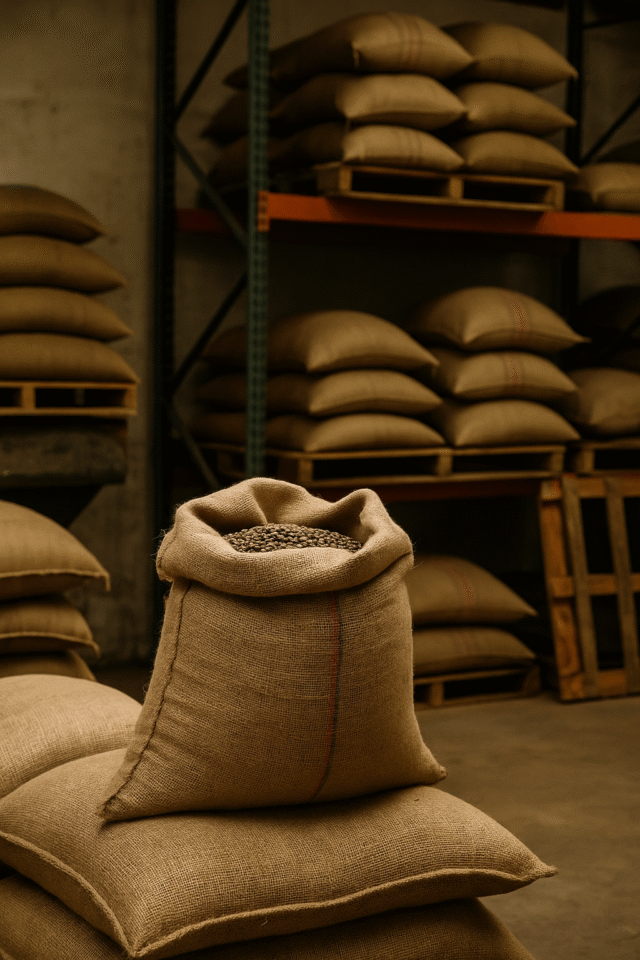Дубай – Qahwa World
Мировой рынок кофе вступает в период повышенной неопределённости: запасы сертифицированного кофе достигли минимального уровня за последние годы, что указывает на ужесточение поставок и усиливающееся давление на цены. Согласно сентябрьскому отчёту Международной организации кофе (ICO) за 2025 год, как арабика, так и робуста демонстрируют резкое сокращение запасов, вызывая тревогу среди трейдеров и производителей относительно устойчивости глобальных поставок.
В отчёте отмечается, что запасы сертифицированной арабики в США сократились на 19,3%, до 0,66 миллиона мешков по 60 кг, а запасы сертифицированной робусты в Лондоне — на 4,3%, до 1,08 миллиона мешков. Организация охарактеризовала эту тенденцию как «чёткий сигнал дефицита предложения», предупредив, что при сохранении текущего тренда рынок может столкнуться с дальнейшей волатильностью и ростом цен в начале 2026 года.
Падение запасов совпало с ростом цен: сводный индикатор цен ICO (I-CIP) в сентябре составил 324,62 цента США за фунт, что на 9,3% выше, чем в августе, и на 25,4% выше, чем годом ранее. Эксперты отмечают, что рост цен обусловлен не только спросом и спекулятивной активностью, но и истощением физических запасов, так как трейдеры и обжарщики активно используют текущие резервы для покрытия спроса.
В Бразилии, крупнейшем производителе и экспортере кофе в мире, экспорт продолжает снижаться, несмотря на высокий урожай. По данным Совета экспортеров кофе Бразилии (Cecafé), поставки сокращаются десятый месяц подряд, чему способствуют задержки в порту Сантус и проблемы с таможенным оформлением. Значительная часть урожая остаётся на складах внутри страны, ожидая транспортировки, что ограничивает поступления на международные биржи.
В Колумбии, крупнейшем поставщике мытой арабики, экспорт также страдает от неблагоприятных погодных условий и проблем с инфраструктурой, ограничивающих логистику. В то же время Вьетнам, ведущий производитель робусты, сохраняет стабильные объёмы производства, но сталкивается с задержками в цепочках поставок, особенно при доставке в Европу и США.
ICO подчёркивает, что совокупность этих факторов создала хрупкое равновесие, при котором спрос остаётся устойчивым, а предложение не успевает за ним. «Темпы сокращения сертифицированных запасов приближаются к уровням 2021 года», — говорится в отчёте, где отмечается, что баланс между производством и потреблением становится всё сложнее поддерживать из—за торговых и логистических препятствий.
Ситуацию усугубляют торговые барьеры. Импортная пошлина США на кофе в размере 50%, действующая с начала года, продолжает снижать объёмы закупок. Многие импортеры предпочитают использовать текущие запасы, а не закупать новые партии по высоким ценам. Это ускоряет истощение мировых резервов и повышает напряжённость на рынке.
Кроме того, снижение процентной ставки Федеральной резервной системой США на 25 базисных пунктов впервые с 2024 года вызвало новый приток инвесторов на сырьевые рынки. ICO отмечает, что спекулятивный интерес усилил давление на физические запасы, поскольку трейдеры ожидают дальнейшего роста цен.
В Европе дополнительную неопределённость создаёт Регламент ЕС по предотвращению вырубки лесов (EUDR), который требует от экспортеров предоставлять геолокационные данные и подтверждать устойчивое происхождение продукции. Хотя Европейская комиссия рассматривает отсрочку вступления регламента в силу на один год, многие компании решили временно отложить поставки, дожидаясь окончательной ясности, что дополнительно ограничивает доступность кофе на рынке.
Аналитики предупреждают, что сочетание низких запасов, торговых ограничений и регуляторных задержек может привести к дефициту поставок уже в начале 2026 года. «Рынок балансирует на грани, — цитирует отчёт слова аналитика. — При таких низких запасах даже небольшие сбои — будь то погодные, логистические или политические — могут вызвать резкий скачок цен».
Реакция уже видна на фьючерсных рынках: цены на арабику на бирже ICE в Нью—Йорке выросли на 11,5% до 366,31 цента за фунт, а на робусту в Лондоне — на 8,9% до 197,56 цента за фунт. Разрыв между двумя площадками расширился на 14,7%, достигнув 168,75 цента за фунт, что является максимумом 2025 года.
Кроме того, среднесуточная волатильность цен выросла до 13,8% (против 10,6% в августе), что, по словам ICO, свидетельствует о повышенной чувствительности рынка к спекуляциям и колебаниям валют.
Некоторое облегчение ожидается с началом сезонов сбора урожая в Центральной Америке и Восточной Африке, однако организация предупреждает, что восстановление будет медленным из—за высоких затрат на удобрения и рабочую силу, ограничивающих инвестиции фермеров.
В заключение ICO отметила, что историческое сокращение запасов сертифицированного кофе отражает глубокий структурный дисбаланс между предложением и спросом, сформировавшийся за последние два года. Торговые барьеры, логистические заторы и регуляторная неопределённость ограничивают поставки в условиях растущего мирового потребления. Если ситуация не улучшится к началу 2026 года, рынок может столкнуться с продолжительным периодом высоких цен и нестабильности.
ICO призывает участников отрасли — от производителей до импортеров — сосредоточиться на эффективном управлении цепочками поставок, устойчивом производстве и согласовании торговой политики, чтобы восстановить стабильность на мировом кофейном рынке.
